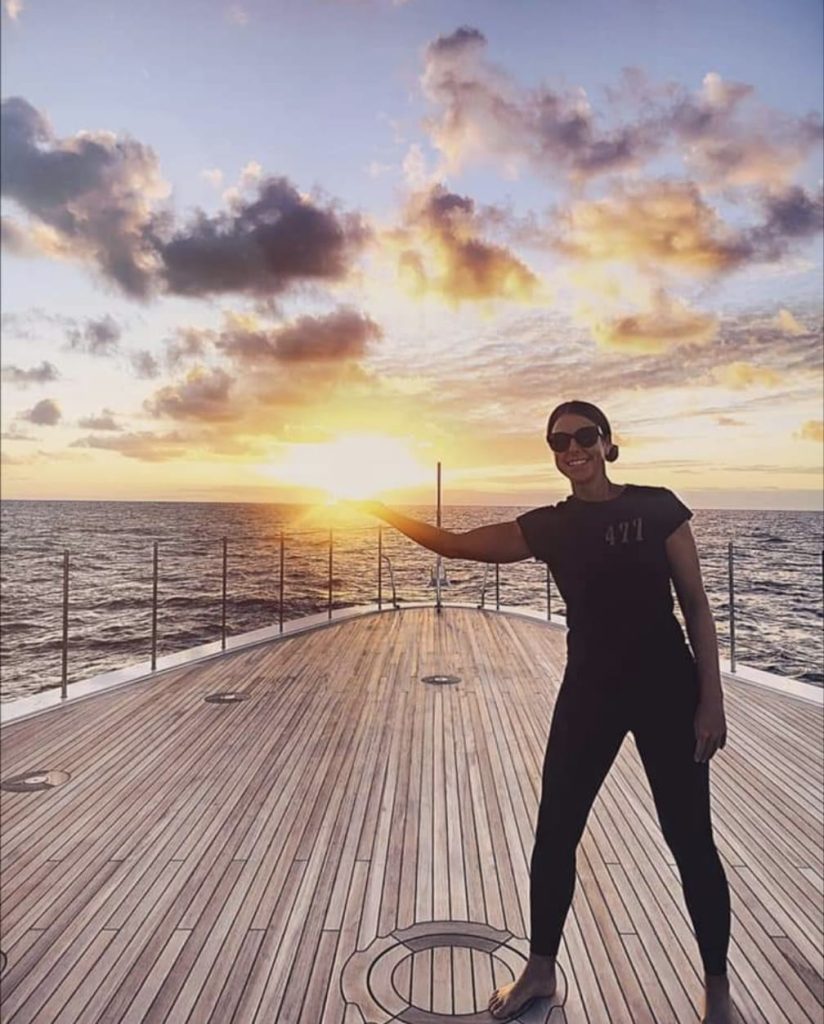In this month’s Life After Yachting article, we spoke to Charlotte Saunders. From doing a little bit of everything to becoming Chief Stew, she’s had an extensive career onboard with over 20 years! Now she’s transitioning to life on land (after 3 attempts to leave yachting!), she has some great tips on how to adjust…

How long did you work onboard? What was your role and which yachts did you work on?
I was in the yachting industry for around 20 years. I started at the young age of 20 and officially left in September last year, so that makes it about two decades, though I did take some winters off and had a couple of brief breaks. My role predominantly was Chief Stew by the end of it, but I started as a stewardess and spent time as a crew chef and had time working on deck. So, I’ve kind of done a little bit of everything apart from engineering.
As for the yachts, I’ve worked on several, mostly ranging from 40 metres to over 100 metres, with my last yacht being the 100m +. I predominantly worked on and off for the same family for about ten years. It was really lovely, and I served on three different yachts with them. Although it was ten years, it was a mix of different yachts and different captains, each running things quite differently. It was nice to build up a good relationship with the family, who were always lovely and maintained their human touch despite being billionaires.
I did enjoy being in the galley and sometimes wonder how life would have been different if I had stayed on that route. I also liked some aspects of being on deck, even though it was just temporary, helping out. As a Chief Stew, I didn’t mind getting my hands dirty, and I think it’s important to see how other areas and departments are run.
When did you leave the Superyacht industry and what were your reasons for leaving?
At the end of 2019, I left the superyacht industry, having thought about it for a while, and decided it was time to move on. Back home in the UK I bought a place and thought, “No, you know what, I’m ready to leave.” I had a bit of a plan in the back of my head but nothing set in stone. I wanted to finish the year, catch up with people I hadn’t seen for a while, and work on my home.
At the start of the new year, I was planning to look for freelance work in London. But then COVID happened, and with no work coming in, a previous captain got in touch with me, and I went back into yachting on a temporary basis. A friend mentioned her husband was looking for a Chief Stew for a full rotation job, it was the biggest yacht I’d worked on, and I thought, “Why not give it a go?” Initially, I planned to do it for a year and a half, but two and a half years later, I realised it was time to leave for good.
I hit 41 and felt I didn’t want to be sleeping in a bunk bed anymore. I wanted to go home, have a routine, and start my own thing. The last yacht I worked on inspired me to start my own venture, Inspired Crew. It was a mix of my age and the desire to start my own business that led to my decision. After 20 years, it was time.
I was very lucky with my last yacht. The people I worked for helped me transition into a shoreside role, allowing me to continue working for them from home. It’s been amazing and has provided me with a steady income and allowed me to still be part of a fabulous team.

Before leaving, did you plan an exit strategy?
Yes, I did have an exit strategy. I had given myself a plan and spoken to the yacht, letting them know I was thinking of leaving at some point. I ended up working with them for another nine months, during which time I worked with a business branding lady. The more I talked more about what would become Inspired Crew, the more passionate I became more about it.
While still on board, I was planning as much as I could. I also created a role that I thought would benefit the yachts. This time, leaving yachting, I had a clear plan, with some income still coming in and something substantial to focus on. I was determined to make it work. So yes, I do think you need a plan because my last two attempts to leave didn’t go as well.
Most important lesson you learnt as a crew member that you now apply to day-to-day life on land?
I think the most important lesson I learned as a crew member is being adaptable. In yachting, you have to be very adaptable and fit in quickly. When you join a new yacht, you need to adapt to that environment and fit in with the crew. You also have to adapt to different guests and their needs. The workload can vary, and new crew members come and go, so you never know what situations will be thrown at you throughout the day.
Coming home, I’ve had to adapt to land life in much the same way. Yachting requires you to be able to handle change and adapt quickly to different situations since no two days are the same. This adaptability has helped me in my new role at home, juggling different jobs and priorities, especially when running the interior of yachts, where there are always multiple things happening at once. This skill has been invaluable in setting up my business and managing my new responsibilities.
What is your current job role, and where are you based?
I currently have two roles. The first is a shore side support role for the yacht, which I’ve been doing since October last year. I support the crew and owners rep working on itineraries, making bookings and complete other projects for them.
The second role is as the founder of Inspired Crew, which has just launched. So, I’m juggling both roles right now, there have been a lot of late nights! This year, I’m prioritising myself and the startup. I know there will be long hours and lots of learning along the way, but I’m focusing on the business, often sacrificing weekends and social time to make it work.
I plan to continue with the shore side work for as long as I can. Eventually, I’ll hand that over and focus solely on Inspired Crew.
Can you tell us more about Inspired Crew and what you do on a day-to-day basis?
Inspired Crew is going to be a recruitment agency specialising in crew members with a secondary skill set and exceptional talent. There are some fabulous crew agencies that I’ve had the pleasure of working with, but I noticed a gap when it came to recruiting for positions that required a secondary skill set.
In my previous role, we were constantly looking for crew members who could multitask. For example, our spa housekeepers needed to know hairstyling, makeup, facials, and massage. We also looked for yoga instructors, beauty therapists, security personnel, dive deckhands, nurses, or paramedics. At one point, we were struggling to find someone with the right mix of skills. That’s when I thought it would be great if all these multi-talented individuals could be under one roof.
There are so many crew agencies now, and while there are numerous crew members signed up with them, some talented individuals still get missed. From my experience as Chief Stewardess, I typically used three to five crew agencies, and not all crew members sign up to every agency so they may not have been visible to me. Inspired Crew aims to bridge that gap by focusing on multi-skilled individuals who can provide diverse services.
A lot of yachts, especially charter yachts, are now using social media to promote themselves and offer their guests an unparalleled experience. Having crew members with additional skills, such as exceptional mixology, videography, personal training or musician / DJ, can greatly enhance guest satisfaction, particularly in remote locations where guests can’t easily access shore services. For instance, if you’re in Antarctica, you can’t just pop ashore to a bar and to listen to some music. So having a crew members onboard with an array of skills is a huge asset.
On a day-to-day basis, I’m juggling both the shore side support role for a yacht and the operations of Inspired Crew. This involves a lot of late nights and prioritising tasks, often sacrificing weekends and social time to ensure everything runs smoothly. It’s all a learning process, but I’m passionate about making Inspired Crew a success and providing yachts with the best multi-talented crew members in the industry, whilst seeing crew thrive in roles that align with them where they can continue to grow.

The good, the bad and the ugly parts of transitioning from yachts to shore?
The Good: Transitioning from yacht life to shore has been quite exciting. One of the best parts is gaining a sense of independence. Onshore, I have the freedom to do what I want when I want, within the constraints of work, of course. I can establish a routine, like going for a morning walk every day before starting work, joining a gym, and meeting new people. Running and catching up with friends and family have become regular activities, which is a refreshing change from the yacht life where routines are more rigid and often limited to work and sleep. It’s nice to have the autonomy to structure my days and enjoy simple pleasures like a morning walk.
The Bad: There are definitely some downsides. For one, I now have to handle all my cooking and do the dreaded ironing. I do actually enjoy cooking and like to experiment with new dishes but ironing is just very boring… it’s funny though as I used to love escaping to the laundry room some days in my junior, years. The lower salary onshore is also a significant adjustment. Yacht salaries are quite generous, so moving to a lower income has been a bit of a shock, but I wouldn’t change it! Another challenge is the social aspect; I’m used to being surrounded by 30-plus crew members, sharing laughs and daily interactions. Now, I’m often on my own, which can be a bit lonely.
The Ugly: The most unappealing part of transitioning to shore life is having to really monitor your finances and pay taxes. I used to take this for granted, and not really think about it hugely, knowing I was blessed to be on a good salary without too many outgoings, you definitely realise how expensive things are when you’re back in the “real world”.
What is the hardest struggle you have faced since leaving the industry, and how did you overcome it?
The hardest struggle I’ve faced since leaving the industry has definitely been dealing with the solitude when I’ve been used to being around so many people. My family is quite small and live a couple of hours away from me, and my friends are scattered in the South of France and around the UK, so it’s been a little challenging at times.
I’m generally fine and enjoy my own company, but I do miss the giggles I shared with fellow crew on a daily basis. To overcome this, I’ve made a conscious effort to connect with people in the area and build a community around me.
Now, I have a few close friends here, and I make sure to stay busy—whether it’s going to the gym, taking walks, or just keeping myself active. There are still days when it feels tough, but I’ve learned that it’s important to push myself to get out and engage with others.
Read more: Life After Yachting: Carmen Preda. Crew Life & Capsea Yachting!
Did you have any other career options in the back of your mind when you were considering your life after yachting?
When I was considering life after yachting, I did have a few career options in the back of my mind. I’ve always been interested in interior styling and professional organising, and at one point, I even thought about starting my own business in that field. It might sound a bit odd, but I actually find cleaning therapeutic—well, maybe not ironing, but definitely the cleaning side.
Becoming a life coach was something I considered. I did some training because I really like the idea of helping, supporting, and guiding people. I thought about integrating that into something like Inspired Crew, bringing a bit of that coaching aspect into it.
However, I didn’t have a concrete plan, which I’ve come to realize is important. Without a plan, it’s too easy to fall back into old patterns or end up doing something you’re not passionate about.
If you could return to the start of your yachting career, would you change anything?
If I could go back to the start of my yachting career, there are a couple of things I might change, but overall, I don’t have any major regrets. I would have liked to experience working on a new build project, as I love seeing things coming together and it would have given me valuable experience. Also, I spent most of my career on private yachts, so maybe doing a bit more chartering would have been fun!
That said, I believe everything happens for a reason. If I had taken those different paths, I might not be where I am today. One thing I do wish I had done earlier, though, is buying a house. But generally, I’m happy with how things turned out.
What kind of positive changes would you like to see in the industry?
Yachting is an amazing industry with so much to offer, but it can also be incredibly demanding. The long hours, the lack of personal space, and the inability to step off the boat can really take a toll on mental health. One positive change I’d like to see is the introduction of mental health support, either by having someone on board as a first aid mental health trainer or designating someone ashore that crew members can talk to about any issues they’re facing, whether on board or in their personal lives. It’s important to acknowledge that everyone struggles at times, and there’s no shame in that—having a cry or needing to talk should be normalized.
Another positive change I’d like to see is an increase in virtual roles to support crew members, particularly those in head-of-department positions. These roles could help manage some of the administrative workload, which can be overwhelming when you’re also trying to handle the day-to-day operations on board. I think both of these changes would significantly improve the mental health and well-being of crew members.
What does success mean to you and what is your career vision for the next 5 years?
For me, success is about being happy. You can have all the money in the world, but if you’re not happy with yourself and your life, what’s the point? So, happiness is really important to me.
As for my career vision over the next five years, I want to focus on helping crew members find jobs that truly align with who they are. I have this vision of running workshops for crew members, where professionals—like a photographer, florist, or spa specialist—can share their skills with others who are interested in those areas. Hopefully, more yachts employ crew with secondary skill sets and to witness the extraordinary things they can create. I want to continue growing Inspired Crew and making it successful, helping more crew find fulfillment in their careers.
Lastly, can you share 3 pieces of advice for crew members thinking about their life after yachting.
Have a Plan: Don’t just leave yachting thinking you can wing it. It’s important to really think about what you enjoy and what you’re passionate about and look at getting qulified in that area if you need to. If you’re unsure, seek guidance—talk to a mentor or a coach, and try different things out to see what resonates with you. Without a clear plan, you might end up back in yachting or in a job you don’t truly want.
Don’t Be Afraid to Ask for Advice: Whether it’s advice from a professional, a friend, or someone who’s already transitioned out of yachting, don’t hesitate to reach out. Getting different perspectives can help you navigate your next steps and avoid feeling lost or overwhelmed.
Save and Invest Wisely: It’s easy to spend money on nights out or things that don’t add long-term value. Instead, focus on saving and investing. Consider buying property, even if it’s not somewhere you plan to live immediately—you can always rent it out. Set up different money-saving pots: one for your monthly spending, one for savings, and one for investments.
To read more Life After Yachting articles, click here.
If you are interested in featuring in your own Life After Yachting segment, please get in touch via hello@superyachtcontent.com
To keep up to date with the latest Superyacht Content News, click here.
Sign up to our Newsletter below:









.gif)










